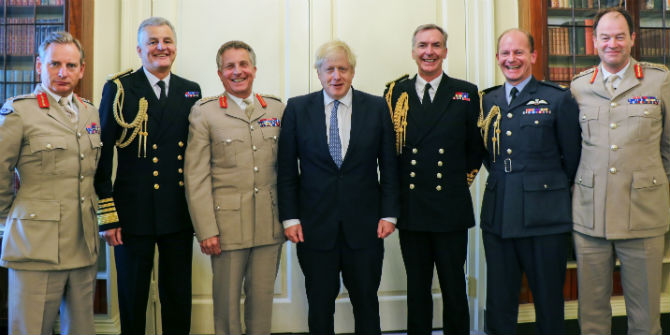
 Faced with a debt crisis in Greece and a refugee crisis on Europe’s borders, the European Union is currently navigating one of the most difficult periods in its history. But do these crises offer justification for scaling back European integration? Lukas Hakelberg and Zoe Lefkofridi write that more integration not only offers the most natural solution for resolving these issues, but also remains the best mechanism for managing the wider challenges posed by globalisation.
Faced with a debt crisis in Greece and a refugee crisis on Europe’s borders, the European Union is currently navigating one of the most difficult periods in its history. But do these crises offer justification for scaling back European integration? Lukas Hakelberg and Zoe Lefkofridi write that more integration not only offers the most natural solution for resolving these issues, but also remains the best mechanism for managing the wider challenges posed by globalisation.
The Eurozone crisis and the accommodation of refugees revealed the inter-relationship between European Union and domestic policy to mass publics. Critics who advocated a partial rollback of European integration received little opposition from traditionally pro-EU party elites; scared of losing votes to nationalist-populist-Eurosceptics, they, too, retreated to state-centric calculations of interest and increasingly chauvinistic discourse. Pro-EU parties in government thus tied their own hands, instead of taking bolder steps towards political integration.
In contrast, we argue that more integration is not only the optimal path for resolving the crisis. For EU citizens, it is also the best response to the challenges posed by globalisation. Policymakers should therefore discard nationalistic discourse and policies involving ‘exits’ or ‘reverse gears’ for good. Instead, they need to forge unity and make sure that European citizens – the actual sovereign also at the EU level – have a say in European politics. In view of this, traditional party elites must implement a number of institutional reforms and transfer their own organisations’ ‘loyalty’ to the community.
L’ union fait la force
European unity is most crucial now that governments are renegotiating the rules of the world economy. To give just three examples, they are about to determine whether environmental regulation is an objectionable non-tariff barrier to trade, tax avoidance a legitimate business strategy, and arbitration a means for foreign investors to challenge public policy.
Owing to the ascent of emerging economies, even the largest EU members are losing sway, whereas the EU as a whole has the potential to remain an influential player in such global negotiations. Its decisive power resource is the single market, the world’s largest consumer market – a status it will retain for some time to come. It contributes such an enormous chunk to the revenues of multinational corporations that hardly any of them would leave voluntarily. They will therefore always (if grudgingly) comply with EU rules, if access to the single market is compliance-dependent.
On this basis, the EU already enforces a wide range of environmental, consumer protection, and anti-trust regulation vis-à-vis foreign corporations. It also exports many of its product and regulatory standards to international organisations and other governments. In addition, the EU disposes of enough market power and regulatory capacity to leave a distinctly European mark on international tax law, and the rules for global finance.
It could, for instance, fight corporate tax evasion with an EU-wide diverted profits tax, or introduce a financial transactions tax without risking divestment – its share in global demand for goods and capital being simply too big. To further reduce this risk, the EU could moreover condition market access of foreign corporations on the introduction of similar measures by their respective home governments, a strategy the United States applies in financial regulation. To date, the EU’s failure to translate its potential into actual influence on global rules regarding tax and financial matters is mostly due to persistent disunity among member states, and the absence of a common vision regarding what a European approach would involve.
Against this background, policymakers interested in defending the interests of European citizens at the global level need to do two things. They need to forge greater unity, and enable citizens to actually determine the EU’s political tack. That is, to provide common visions in policy fields where these are currently absent. Greater unity can only emerge if approaches involving exits or reverse gears are filed away for good. This is because a perceived exit or reversal option in one policy field may also put necessary cooperation in others into question.
In the UK, for instance, the proponents of a ‘Brexit’ were also the biggest fans of ‘Grexit’, as they expected a boost for their own cause. Currently, the UK government uses the exit threat to wrestle important concessions from EU partners concerning, among other areas, the impact of EU regulation on the City of London. A reversal of monetary union or a member’s exit from the EU may trigger ‘spill-backs’, thus grievously undermining the EU’s capacity to impact global rule-making to the benefit of Europeans.
Power to the citizens
 Instead of seeking refuge in short-sighted renationalisation, EU leaders should subject common policies to the systematic scrutiny of EU citizens. The latter must be able to hold European leaders accountable for their decisions, and – through their representatives – impact policy content during negotiations at the EU level. The crisis response has obviously fallen short of this ideal. Most visibly in Greece, the EU made important inroads into national prerogatives in fiscal, and social policy. The underlying agreements were, however, reached without the participation of the European Parliament.
Instead of seeking refuge in short-sighted renationalisation, EU leaders should subject common policies to the systematic scrutiny of EU citizens. The latter must be able to hold European leaders accountable for their decisions, and – through their representatives – impact policy content during negotiations at the EU level. The crisis response has obviously fallen short of this ideal. Most visibly in Greece, the EU made important inroads into national prerogatives in fiscal, and social policy. The underlying agreements were, however, reached without the participation of the European Parliament.
Likewise, EU leaders established the European Stability Mechanism, and the Fiscal Compact by international treaty, outside traditional EU decision-making processes. Hence, they created two institutions – one raising capital for financial assistance to Eurozone members, the other obliging members to transpose the Stability and Growth Pact’s deficit targets into national law – that severely constrain the budgetary prerogatives of national parliaments. Still, they did not provide for parliamentary control to correct the ensuing democratic deficit, as national parliaments could not amend, but only ratify or reject these treaties.
In view of reinstating popular sovereignty over core state powers, and fighting citizens’ frustration about their weak voice in European politics, several reforms are required. In principle, all decisions should be taken according to the community method. That is, the Commission initiates, and the Council and EP debate, amend, and vote on these initiatives. To give citizens greater sway in this process, however, electing the Commission president (among Spitzenkandidaten like in 2014) and confirming Commissioners through the EP is not enough. The Commissioner for Economic and Financial Affairs should additionally chair the Eurogroup instead of the current president, who is selected by finance ministers.
Moreover, a European chamber – that would consist of deputies at the EP or national parliaments – debating, amending, and voting on Eurogroup conclusions should be established so that parliamentarians can be involved in crafting agreements, rescue packages, and new institutions before they are finalised. This would not just enable them to exercise their budgetary prerogative, but also encourage the formation of alliances based on political rather than national affiliations. In any case, these reforms are a means for establishing a more direct link between parliamentary elections and the political tack of decision-making at the EU level, especially in the Eurogroup.
All this presupposes that member states’ party organisations make a genuine effort in meeting the challenges of a multilevel polity. Although the reelection of parties is dependent upon national electorates, in the EU-28 polity, no single party can unilaterally affect any policy outcome, irrespective of the size and power of the member state. Hence, parties must raise European solutions to problems and issues concerning all Europeans (e.g. TTIP, migration, consumer protection, labour rights) .
For an effective pursuit of policy goals – and consequently also citizen representation – parties must forge transnational links so as to promote their goals through a common front at the EU level. As a result, antagonisms between member states could gradually be replaced by competition between supranational parties (groups of likeminded national parties). Hence, pro-EU party elites – who had deliberately kept the EU at their organisational periphery and outside electoral politics – should now transfer their organisations’ “loyalty” to the community.
In the end, they can either integrate citizens better into EU decision-making and promote political integration, or watch Eurosceptic parties undermine popular support for the EU. The latter option would pave the way for a renationalisation of policymaking, the EU’s decline into global irrelevance, and ultimately the return to the nationalism and chauvinism the EU was built to cure.
Beyond greed and grievance: pursuing the common European good
But do the proposed reforms have a chance of being implemented? Recent data suggest that a majority of EU citizens can be convinced of more integration to the common benefit. According to Eurobarometer data from 2013, 55 per cent of EU citizens held at least a secondary European identity. That is, they identified with Europe and their home country. In 2014, 67 per cent of Eurobarometer respondents felt they were “EU citizens”, and 57 per cent supported monetary union.
Crucially, greater identification with Europe increases support for economic governance with redistributive features. Among Eurozone citizens, a majority support financial assistance to member countries in economic difficulty, and even in Germany only 23 per cent of respondents are fundamentally opposed to bailouts. The remaining 77 hold contingent views depending on the perceived economic burden for Germany, and credible reform efforts in recipient countries.
Hitherto, pro-EU parties have not done much convincing but succumbed instead to the temptation of blame-games. How could this trend be reversed? As power generates greater expectations and responsibility, Germany must take the lead in showing greater European solidarity. Germany – the major beneficiary of economic and monetary integration and of the Greek crisis – has both the economic might and the administrative capacity to promote European recovery.
Hence, instead of nationalistic moralising against the South’s (alleged) profligacy, the message the Bundesregierung needs to send to German voters, and EU partners alike is that Germany is both strong and willing enough to invest in a brighter common future. Its suspension of the Dublin agreement for Syrian refugees, relieving periphery countries like Italy and Greece, could be a first step towards renewed European solidarity rooted in the insight that common problems need common solutions and a fair distribution of burdens. As Helmut Kohl put it 20 years ago, “the important challenges ahead of us demand our cooperation. They cannot, as suggested by old thinking oriented towards the nation-state, be solved by individual countries”.
Note: This article first appeared at LSE’s EUROPP blog. This article gives the views of the author, and not the position of BrexitVote blog, nor of the London School of Economics and Political Science. A longer version of this article will be published as a policy brief for the Österreichische Gesellschaft für Europäische Politik.
Shortened URL for this post: http://wp.me/p6zUkq-1o
_________________________________
 Lukas Hakelberg – European University Institute
Lukas Hakelberg – European University Institute
Lukas Hakelberg is Researcher at the Department of Social and Political Sciences of the European University Institute in Florence and Visiting Fellow at the Humbolt University in Berlin.
 Zoe Lefkofridi – University of Salzburg
Zoe Lefkofridi – University of Salzburg
Zoe Lefkofridi is Assistant Professor of Comparative Politics at the University of Salzburg and Joint Jean Monnet-Max Weber Fellow at the Robert Schuman Center of Advanced Studies of the European University Institute in Florence.






